Love in Chinese Culture — Love Tokens Beyond Word
Love is a permanent topic. It lasts as long as human history and needs constant expression.
To say love in Chinese culture, love tokens are widely used to confirm relationships or show someone's affection besides Words and Symbols.
In history, when parents arranged marriage and young couples couldn't date freely, love token was widely used to confirm their relationship.
When men needed to set off to the battlefields, they would exchange tokens with their loved ones to leave each other something to remember.
Love tokens in Chinese culture should have a very special connection with the person who gives them away, usually something heirloom or exquisitely handmade articles.
Once love tokens are exchanged, they pledged their loyalty and eternal love.

Begonia Flowers by Xiang Shengmo (1597 — 1658)
Importance of Hair in Chinese Culture
In ancient Chinese culture, hair was considered an essential body part given by parents and couldn’t be cut casually.
When people get married, tying a strand of the new couple’s hair together is a meaningful ceremony, meaning they would be connected forever.
In the past, when a man was allowed to have many women, only the most honorable wife was qualified to have this Bind Up of Hair Rite with her husband at their Wedding; other inferior concubines were not allowed to have this rite.
Therefore, cutting off a wisp of hair and handing it out was a serious means to convey someone’s love and commitment.
If a girl gives a boy a strand of her hair, that means she is deeply in love with him, even though she has never said it out loud.
Indeed, the wisp of hair would always be well decorated, using a red ribbon or in an exquisite handmade pouch.

Part of the Painting "Beautiful Ladies" by Artist Qiu Ying (about 1498–1552)
Traditional Chinese Love Token — Comb
Considering the hair’s importance in ancient Chinese culture, the comb is a necessary personal effect and romantic love token.
Every day, using a comb that the beloved one gives is quite sweet and lovely.
Moreover, starting from the Three Kingdoms, Jin, North, and South Dynasties (220 — 589), women started to put comb on their hair as decoration, which included more valuable materials and adornments in combs.
On the Traditional Chinese Wedding day, combing the bride’s hair is an important rite, symbolizing everything is smooth and lucky, and the new couple stays together happily till their hair turns gray.

Shubi as Hair Decoration in the Painting "Court Ladies Preparing Newly Woven Silk" by Zhang Xuan of the Tang Dynasty (618–907)
The Most Ancient, Historical Token — Hairpin / Zan
Using the hairpin was representative of being an adult in the history of China.
When women turned 15, there would be a Coming of Age Ceremony to put on hairpins, tie their hair up, and claim them as adults who were ready to get married.
Zan was an essential daily necessity that people wore daily; therefore, giving someone’s beloved woman a beautiful Zan was an excellent way to convey his affection.

Hairpins in the Painting "Portrait of Palace Maidens" by artist Liu Songnian (about 1131–1218)
Double Stringed Hairpin — Chai
Chai was evolved from Zan and was used to fasten and tie hair.
But the most important difference is that Chai has two sticks, which look like two Zans connected.
When a couple has to separate for a while, the woman usually splits her favorite Chai into two parts, each taking one part as a keepsake.
They would then put these two parts back together when the couple reunites.

Hairpin Decorations in the Painting "Court Ladies of King of Shu" by artist Tang Yin (1470–1524)
Self-Disciplined Earplugs to Beautiful Earrings
Thousands of years ago, ancient Chinese would hang two little pendants on their hat or hair ornaments like Zan to use them as earplugs when they needed to rest.
The earplugs were then regarded as a representative of self-discipline and introspection, a highly required characteristic in Chinese culture, for being an excellent way to avoid hearing and believing anything before careful consideration.
Gradually, these two pendants turned into earrings, a decoration worn explicitly by women.
Patterns of earrings have changed with time in the history of China.
However, self-discipline and trust are still essential qualities in a good relationship, which made earrings a meaningful love token for thousands of years.

Earrings in the Portrait of the Queen of Emperor Zhao Gou, by Court Artist of the Song Dynasty (960 — 1279)
Endless and Eternal Love — Ring
The circular ring has no starting or ending point, representing endless and eternal love.
The ring is a historical love token that is essential to a couple's engagement gift in tradition.
Unmarried women didn't wear it in ancient history.
Around a thousand years ago, the ring became a gift only sent from a man to a woman.


Last Emperor of the Qing Dynasty (1636 — 1912) Puyi's Wedding Ring, Carved with Quotes "Wei Jing Wei Yi, Yun Zhi Jue Zhong", From the Ancient "Book of Documents" (Shang Shu) — Palace Museum
Superstitious Origin to Romantic Token — Bracelet
The bracelet was initially used in sacrifice or sorcery in the history of China and later was used as a bond to keep a woman around.
Gradually, it became a love token to show a couple’s wish to be together permanently.

Bracelets in the Painting "Court Ladies Appreciating a Dance" by Zhou Wenju (about 907 — 975)
Fortune and Blessing — Sachet or Xiangnang
Over 2,200 years ago, the sachet was an important personal effect.
Ancient Chinese people had to wear them when they were visiting elders or participating in important ceremonies.
Sachets could be made of jade, gold, silver, or fabric with fancy embroidery and with scented flowers, spices, or medical herbs stuffing inside.
Sachet with spices could make someone smells good, while medical herbs inside are believed to keep people healthy.
Therefore, it soon became a representative of fortune and blessing. Dexterous women usually made sophisticated scented sachets for their beloved ones to wear daily to show their love and respect.
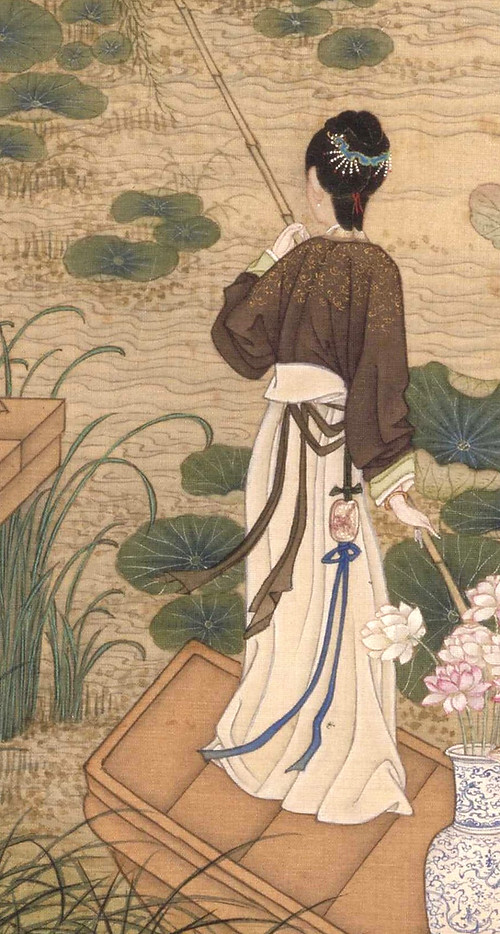
Sachet or Xiangnang in the painting "Gathering Lotus in the Emerald Pond in June" by Chen Mei (about 1694–1745)
Ancient Satchel — He Bao
He Bao is a pouch that can hang on the wrist or wear on the shoulders, in which people can put small or important things, like a handkerchief, coins, or seals.
It was initially made of furs, then developed into a fancy fabric with exquisite embroideries.
However, the colors and image embroidery of He Bao needed to follow the hierarchy strictly in ancient times.
For quite a few centuries in the history of China, officials wore He Bao when they met emperors for work and put important things, like a seal, inside.
Therefore, wearing an exquisite and well-designed He Bao made by beloved ones was believed to be prideful and warm in Chinese culture.
Chinese God of Marriage and His Red Line
In Chinese culture, the God of Marriage is a kind older man who lives under the moon, in a tree or in a mysterious love palace.
He uses an invisible red string to connect a man and a woman on their ankles.
Afterward, this couple would fall in love and end up with a happy marriage, no matter the situation of their ages, class origins, or distances.
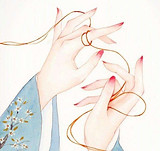
Twined Love by Red Lines — Truelove Knot
The Truelove Knot is twined with two red strings, representing eternal, inseparable love blessed by the Chinese God of Marriage.
In ancient China, on a new couple’s wedding day, each family should provide a red silk ribbon and tie them into a Truelove Knot.
The groom and bride should hold each side of the knot to finish all the rites of their wedding ceremony.
In addition, people also use the Truelove Knot technique to tie the new couple’s hair together after the groom and bride both cut a wisp of hair on the wedding day.
Today, the knot is still widely used in bracelets, earrings, and decoration pendants in China.
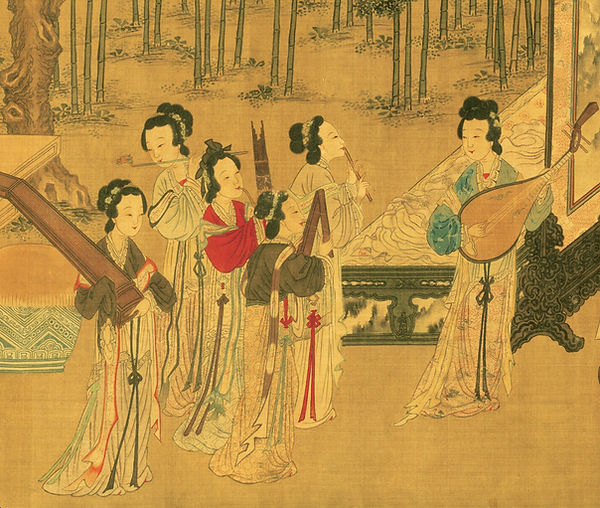
Knot Decorations in the Painting "The Eighteen Scholars" by An Anonymous Artist from the Song Dynasty (960–1279)
The Reward of the True Love — Love Lock
It is said that if a couple is genuinely in love, they could be rewarded a love lock by the God of Marriage.
After they had carved their names on this lock and locked it in a place full of nimbus, like a magnificent mountain, their love would be forever blessed.
Blessed, Honorable Love Token — Jade Pendant or Yu Pei
Throughout the history of China, jade was not only used for decoration.
It also represented noble morals and etiquette, such as gentleness, benevolence, righteousness, courtesy, wisdom, integrity, and loyalty.
Around 3,000 years ago, jade was widely worn by the noble class, and a decent gentleman should always wear jade unless something severe or sad happened.
The jade pendant was usually worn on the waist and outside clothes; some believed it was initially used to hold down people's bottom dresses.
At that time, jade was a presentation of someone's social status and good morals in Chinese culture.
Gradually, both men and women could wear them as decoration.
Later, the jade pendant was disseminated to civilians but followed strict ranks for different social statuses.
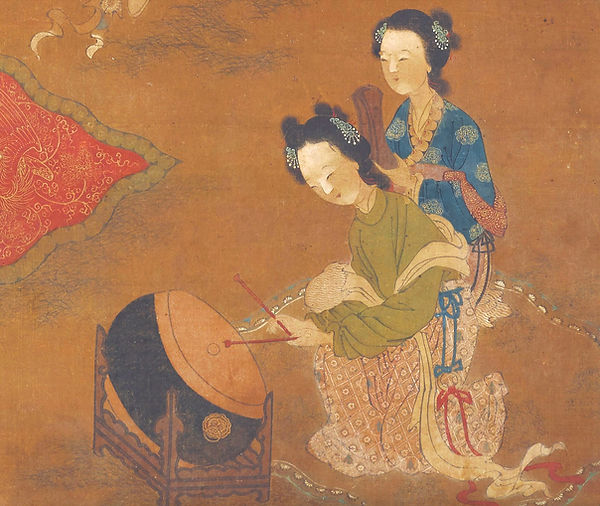
Jade Pendant in the Painting "Court Ladies Appreciating a Dance" by Zhou Wenju (about 907 — 975)
Jade is believed to bring people good luck and protect its owner from bad things.
In ancient Chinese culture, it is said that jade will be inspirited and can protect the owner if humans have worn it for years.
If a jade accessory, which its owner has worn for years, suddenly has a crack or break, it has already resisted a horrible encounter for its owner.
Therefore, a man could give their precious jade pendant to his beloved woman to show her importance to him.
The girl usually would weave a colorful fringe and attach it to the bottom of her sweetheart’s jade pendant, using the same type of fringe that a bride would wear on the wrist on her wedding day.
Nowadays, jade jewelry is still prevalent in Chinese culture, though other forms like a bracelet, rings, or necklaces have replaced jade pendants.

Jade Pendant in the Painting "Beautiful Ladies" by Qiu Ying (about 1498–1552)
Building of Lifelong Love — Longuette
In the history of China, a woman’s skirt was long and usually connected by several pieces of fabric.
Therefore, sending a beloved one a skirt implies the will to build a romantic relationship that is lifelong and perfectly connected.
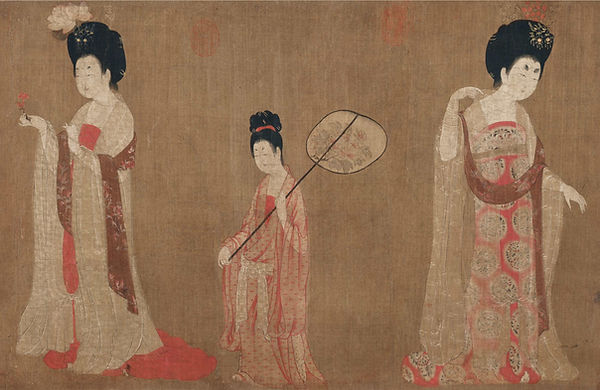
Longuette in the Painting "Court Ladies Adorning Their Hair with Flowers" by Zhou Fang of the Tang Dynasty (618 — 907)
Personal and Intimate Representation — Handkerchief
The handkerchief was a very personal necessity in Chinese culture, which people used to wipe out tears or sweat, especially women, or as beautiful decoration.
Girls usually would make handkerchiefs themselves, using fancy fabric and exquisite embroidery.
Hence, if a girl gives a boy her handkerchief, she likes him or even falls in love with him.
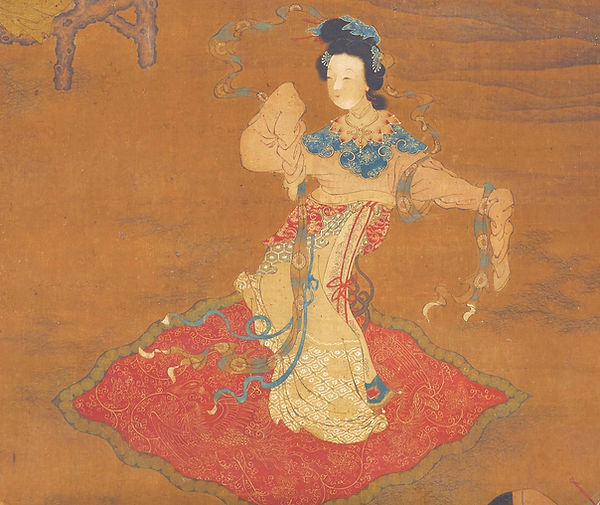
Handkerchief or Shawl Decoration in the Painting "Court Ladies Appreciating a Dance" by Zhou Wenju (about 907 — 975)
Element of Queen's Wall — Sichuan Pepper
The odor of Sichuan Pepper was once believed could exorcise evil spirits; hence, in the history of China, royals used to mix it inside the coating to paint queen'sen’s walls.
Besides, Sichuan Pepper also contains many seeds that have the same pronunciation as kids in the Chinese language.
Therefore, in Chinese culture, sending a bunch of Sichuan Pepper was an implicit way to express the wish to have children with someone.
However, this is no longer used nowadays.

Imperial Ladies in the Painting "Spring Morning in the Han Palace" by Qiu Ying (about 1498–1552)
Witness of Separation and Reunion — Half Thing
In the history of China, it was expected that a couple needed to be separated for a while, sometimes even for decades.
Therefore, they would cut something into two pieces and take half each.
Hairpins, jade pendants, bracelets, jewelry boxes, everything special and preservable would do.
For those who had to leave a place for a long time, or even permanently, the half thing is an essential token and the witness of a relationship and kindred in Chinese culture.

A Pair of Silver Belt Hook Unearthed from Tomb of King Liu Fei (?—189BC), Carved with "Infinite happiness, unforgettable love."
Feeling That Will Never Fade Away — Love Pea
The Love Pea originated from a sad love legend in the history of China.
Thousands of years ago, a woman’s husband was recruited to join the army and protect their country. Years later, other guys from her village came back, except her beloved husband.
She couldn’t believe that her husband would never return to her again. Since then, she has been leaning on a big tree on a nearby mountain, facing the roadway her husband left, when her tears kept dropping into that tree.
Decades later, her tears turned red, and so did beans produced by that tree she leaned on every day.
These red beans are heart-shaped, bright and firm, glittering and translucent, and would never fade or decompose.
Gradually, these red beans officially named the Love Pea, became representative of great love in Chinese culture; many accessories were made of those magical beans.
For a long time, at a traditional Chinese wedding, the bride would wear a Love Pea bracelet or necklace on her wedding day, wishing for a happy marriage filled with love and fortune.
You Might Also Like:
Chinese Symbols for Sweer Love
Chinese Symbols for Longing Love
Chinese Symbols About Lost Love
Valuable Pieces of Jewelry and Their Historical, Cultural Meanings
Beautiful, Exquisite Traditional Chinese Hair Ornaments
Delicate Pendant Accessories in the History of China
Chinese Jade — Origin, History, Meaning, Culture, and Utilization
Chinese Silk — Traditions, Utilizations, Fabrics, Embroideries, Products, and Art
Chinese Fan — History, Classification, Utilization, Art, Culture, and Artifact
Chinese Costume and the Strict Hierarchy in the History
Chinese Patterns — Ultimate Introduction to Origin, History, Meaning, and Culture
Chinese Art — Aesthetic, Characteristic, and Form
Color Symbolism in Chinese Culture
Chinese Zodiac Signs — A Comprehensive Introduction
Chinese Astrology — Three Enclosures, Four Symbols, Twenty-eight Lunar Mansions
Traditional Handicrafts in Chinese Art
Chinese Architecture — Tradition, Characteristics, and Style
Traditional Chinese Instrument
Mysterious and Powerful Creatures in Chinese Legends


